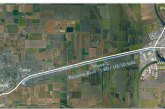 COMMENTARY: Council Ordinance Strikes the Right Balance Between Public Health and Privacy – The first time the issue of a wood burning ban came up back in January 2009, it became a tremendous point of controversy.
COMMENTARY: Council Ordinance Strikes the Right Balance Between Public Health and Privacy – The first time the issue of a wood burning ban came up back in January 2009, it became a tremendous point of controversy.
On the one side were some environmentalists and some health advocates concerned with both the impact of wood burning on the environment as well as health implications. On the other side were citizens who, for a variety of reasons, use wood during the few cold months of the year to heat their homes and provide themselves with some sort of aesthetic enjoyment.
On the evening of the council meeting in early January 2009, the public would pack the chambers, with those opposing restrictions outnumbering those favoring by at least a 2 to 1 margin.
At that time, the council decided to punt. And it made sense to do so given the time of the year, the fact that it was near the end of the burning season, and the fact that the public opinion was strongly against any sort of mandatory restrictions.
Over the next three and a half years, we would see voluntary restrictions, but also be able to collect data on the number of days and the number of complaints.
As we wrote at the time, currently, the public has not been educated as much on wood burning dangers as they have on cigarette smoking. Throw in the problems with enforcement at a practical level and it appeared at that time that a ban on wood burning was premature. Restrictions, however, become a more reasonable goal along with continued outreach.
In three and a half years, the climate has clearly changed on this issue. Despite a series of contentious columns, it was a sparse crowd on Tuesday night at the chambers. About 15 people came to speak and they were relatively evenly split in terms of which way they leaned on the issue.
The amount of time and study allowed the mayor to argue that voluntary restrictions did not work.
“I guess where I am is that if the voluntary program were working we wouldn’t be here tonight, period, ” he said. “If staff were actually able to contact people who were violating during the voluntary no burn and have any teeth to their contact, we wouldn’t be here tonight. The problem would be solved. People wouldn’t be suffering.”
“The very fact that we’re here is that it hasn’t worked,” he added. “I do get emails from people who say, I haven’t bothered to complain because staff can’t do anything.”
The Vanguard followed up after the meeting with the mayor on this point. The mayor noted that the notes that he received were running about 70 percent for an ordinance and about 30 percent against the ordinance.
That is probably a complete reversal from where things stood in January of 2009, when the public sentiment was overwhelmingly against it.
One email, for example, expresses, “I want to thank you for speaking for those of us who have not complained about a neighbor who uses wood to heat her house.”
They write, “My next-door neighbor does have an ‘approved’ stove and has extended her chimney. She knows her burning is a problem – it is not a matter of education. Her smoke is particularly bothersome in the mornings when the south breeze is up.”
“The bottom line is that this neighbor has no intention of stopping her 24/7 burning. I have not complained to the city because, even with this new ordinance, I doubt that there is anything to do. I did talk with folks at the Yolo Solano AQD. I have started a new asthma prevention medicine,” they continue.
In another email, the writer notes, “I was not aware that there was a place in Davis that one could complain about wood smoke in Davis.”
The writer adds, “If the phone number or email address was made available to the public about where they could complain about wood smoke in Davis there would probably be a lot more complaints about wood smoke on no-burn days.”
There has been a lot of effort to diminish the veracity and number of complaints. It appears from the emails received from council,
had the public known to complain, they may have done so more frequently – but the fact that the complaints could not be acted upon also decreased their numbers.
More fundamentally, as the mayor noted, “We are regulating for people affected, so the complaints are EXACTLY who we care about.”
He argued that you do not dismiss complaints from a few folks unless you are convinced that the health impact is not significant.
Council itself deserves a lot of credit for their approach on this issue. They crafted it reasonably. One of the key additions was the visible smoke requirement which diminishes the unlevel playing field that might have resulted from exempting manufactured logs and EPA phase II devices.
There were some absurd suggestions that the city would need to enter one’s home in order to act, but the ordinance is set up so that this would not need to occur. The city would simply document the smoke and issue a letter – first a warning then a nominal fine. Those wishing to dispute it can appeal it.
Finally, there are concerns about incrementalism and the slippery slope.
Toward those concerns, I think the comments of Councilmember Rochelle Swanson are critical.
“There’s been a lot made about the word ban, but it’s really about curtailment and restriction, we’re not trying to outright ban people from using their wood stoves or their fireplaces,” Councilmember Swanson said.
In the end, the council struck a good balance between those who suffer from their neighbors’ burning of smoke, and our right to privacy in our homes. It is a limited ordinance and hopefully it gives the city enough teeth to protect the health of some, if not really all, of its residents.
—David M. Greenwald reporting






“If the phone number or email address was made available to the public about where they could complain about wood smoke in Davis there would probably be a lot more complaints about wood smoke on no-burn days.”
Of course this is Davis if people can complain they will complain.
So did the council pass the wood burning restrictions ordinance on Tuesday night? Your article does not say weather or not it was passed.
Yes – sorry the previous article ([url]http://davisvanguard.org/index.php?option=com_content&view=article&id=5800:council-passes-mandatory-wood-burning-restrictions-in-one-year-pilot-project&catid=88:environment&Itemid=205[/url]) reported that it passed unanimously.
David — Neither the previous article nor this one was clear on what residents are now prohibited from doing. How do we find out whether we can have a fire on a particular day?
That is my biggest concern – apparently the city website and the government channel.
Two Case Histories before the Davis City Council:
Case 1:The Crown Castle Distributed Antenna System:Davis citizens are not allowed to discuss the potential health effects of EMFs from 29 cell phone antennas to be installed within residential Davis.
Case 2:Wood Burning Ordinance:Davis citizens are allowed to discuss the potential health effects of wood smoke within residential Davis
Is the source of this hypocricy due to the fact that EMFs are not visible and wood smoke can be visible?
Quite a good question I think Steve. And clearly illustrative of the need for data. I can’t help but wonder if anyone has so much as contacted Sutter Davis or the County Health Department to try to get actual numbers of ER visits for repiratory complaints on “high risk” vs “low risk” days.
To me, this seems to be a policy that we are attempting to determine on the basis of competing personal preferences as opposed to any observable consequence.
Steve,
Does big business sometimes flex a wee bit of muscle when public policies are drafted?
Oh, of course not, just a fantastical conspiracy theory that big business has any influence on government; or that it ever has advanced its interest while compromising the public welfare. Or if you are skeptical of this statement of history, remember that these are enlighted times, and nowadays big business would never ever do anything that might compromise the general welfare of the public, even if enormous profits are involved; they can be comfortable in their prudent forebearance as the know none of their competitors would do so either.